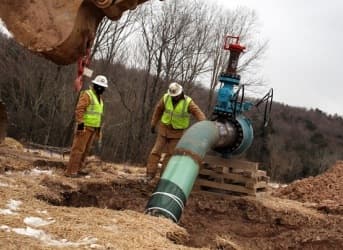The battle for the future of oil and gas drilling in the United States is playing out in Colorado as both the industry and environmental groups step up efforts to beat back the other side. Both sides have claimed successes as public policy seesaws back and forth.
Colorado boasts vast oil and gas resources. The Niobrara shale is thought to have nearly 2 billion barrels of oil. Just as places like the Bakken and Eagle Ford have boomed because of improved drilling technology over the last half decade or so, the Niobrara in Colorado has the industry rushing in. From 2007 to 2012, Colorado’s oil production increased 89% and its natural gas production climbed by 38%.
But, just like other states that experienced a drilling boom, many local residents don’t like it. There are an estimated 52,000 active wells in the state, so there is no question that the drilling presence is being felt by local communities. Several high-profile voter referenda on fracking bans highlighted the growing backlash. The towns of Fort Collins, Lafayette, and Longmont passed fracking moratoria within city limits last November, moves that the industry is seeking to overturn in court. The Colorado Oil and Gas Association filed a lawsuit against Fort Collins and Lafayette, calling the bans illegal.
Voter initiatives seem to be multiplying quickly. Colorado residents have proposed 17 ballot initiatives to ban fracking, or to at least give localities the right to decide. Colorado Congressman Jared Polis has supported local control. But the stakes are only set to rise later this year with the potential for a statewide ballot initiative that if approved would give localities the ability to decide whether or not they would allow fracking – a prospect that the industry obviously fiercely opposes.
Meanwhile, the industry realizes it needs to improve its public image, and has decided to pour money into advertising and PR. An industry front group, Coloradans for Responsible Energy Development, has spent $2.4 million on advertising in the state between October 2013 and March 2014, an indication that the industry both sees a huge opportunity exploiting the state’s resources and also sees an enormous threat from public opposition. CRED also has sponsored an energy section in the Denver Post, which will publish articles on the Colorado energy scene written by people not employed by the newspaper. It appears intended to resemble regular newspaper content, but presumably will cast the industry in a positive light.
What is going in the state may merely be a harbinger for a broader nationwide debate on fracking. “There's going to be more and more discussion about the local government-state tension” when regulating fracking, says the Rick Ridder of Colorado for Local Control, a grassroots organization pushing for greater local autonomy. Many states did not have laws setup to govern hydraulic fracturing before the industry came in. The speed with which the industry spread in places like Pennsylvania, Ohio, Texas, North Dakota, and now Colorado, has often caught regulators by surprise. In the absence of state regulations on fracking – let alone federal standards – municipalities and local communities try to take matters into their own hands. Oil and gas companies pushback, arguing that regulation will kill the golden goose.
The active push by local communities is what makes Colorado interesting. With several municipal fracking bans in place (their legality still pending), and with other towns pushing for greater autonomy, the state is under pressure to either grant more leeway to localities or enact stricter drilling standards. The industry, although fighting back for now, may try to assuage the fears of the public, and make compromises, as it did with methane emissions in Colorado. And the more noise surrounding the issue, the more likely other states, or the federal government, feel compelled to put more limits on fracking.
By Nicholas Cunningham of Oilprice.com


















